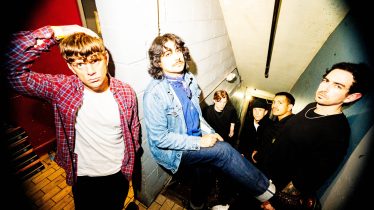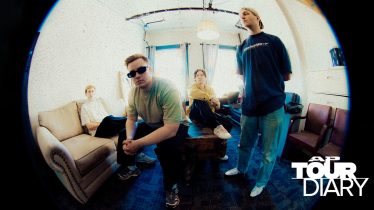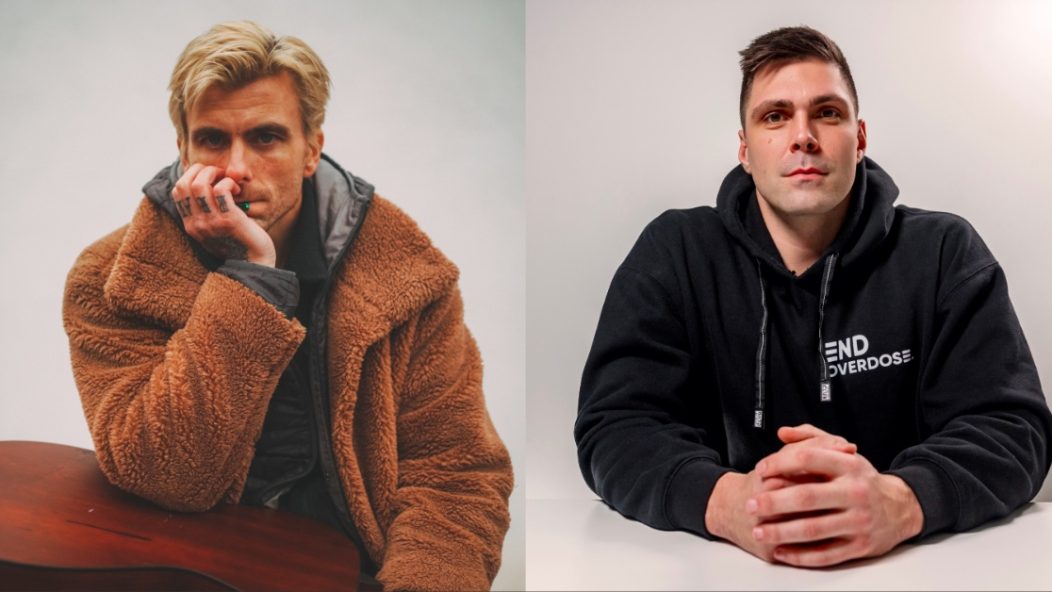
In conversation with Anthony Green and End Overdose founder Theo Krzywicki
End Overdose and Anthony Green appear in our Spring 2024 Issue with cover stars Liam Gallagher/John Squire, Kevin Abstract, the Marías, and Palaye Royale. Head to the AP Shop to grab a copy.
It’s Friday morning, and I’m asking myself — how, and why, did I end up on a three-way call with a firefighter and a post-hardcore musician? The answer, strange as it might sound, is in harrowing, beautiful shared experience. Call it a “spiritual sickness,” “dependency,” or “substance abuse problem,” but Theo Krzywicki, Anthony Green, and I have all known addiction.
Though he has suffered at its hand himself, it was years into recovery, as a full-time member of the LAFD, that Krzywicki became acutely aware of the epidemic our world is in today. With 100,000 people dying from overdoses a year, as a trained paramedic, Krzywicki found himself alone responding to thousands. “I’ve been on so many calls where people stood there helpless watching their friends die. It doesn’t have to be that way,” he says, fervently. “We have the antidote and the training — it’s like CPR.” Thus began End Overdose, a 501(c)3 nonprofit, and Krzywicki’s endeavor to educate the public on how to respond to overdose emergencies.
Read more: 10 most criminally underrated Circa Survive songs
In pursuit of an audience who could help the most — those between ages 18-45, for whom drug-related overdoses are the No. 1 cause of death — End Overdose found their sweet spot in the music space. “I would argue the music scene is one of the single most important spaces to connect with if you are trying to reach people,” Krzywicki tells us. From the first event, a naloxone training seminar at the Echoplex following the death of Lil Peep, until now, the organization has gone on to partner with the Los Angeles Nightlife Alliance, AEG, Live Nation, Insomniac Events, collaborate directly with artists, and host demonstrations and trainings, setting up chapters in cities across the country.
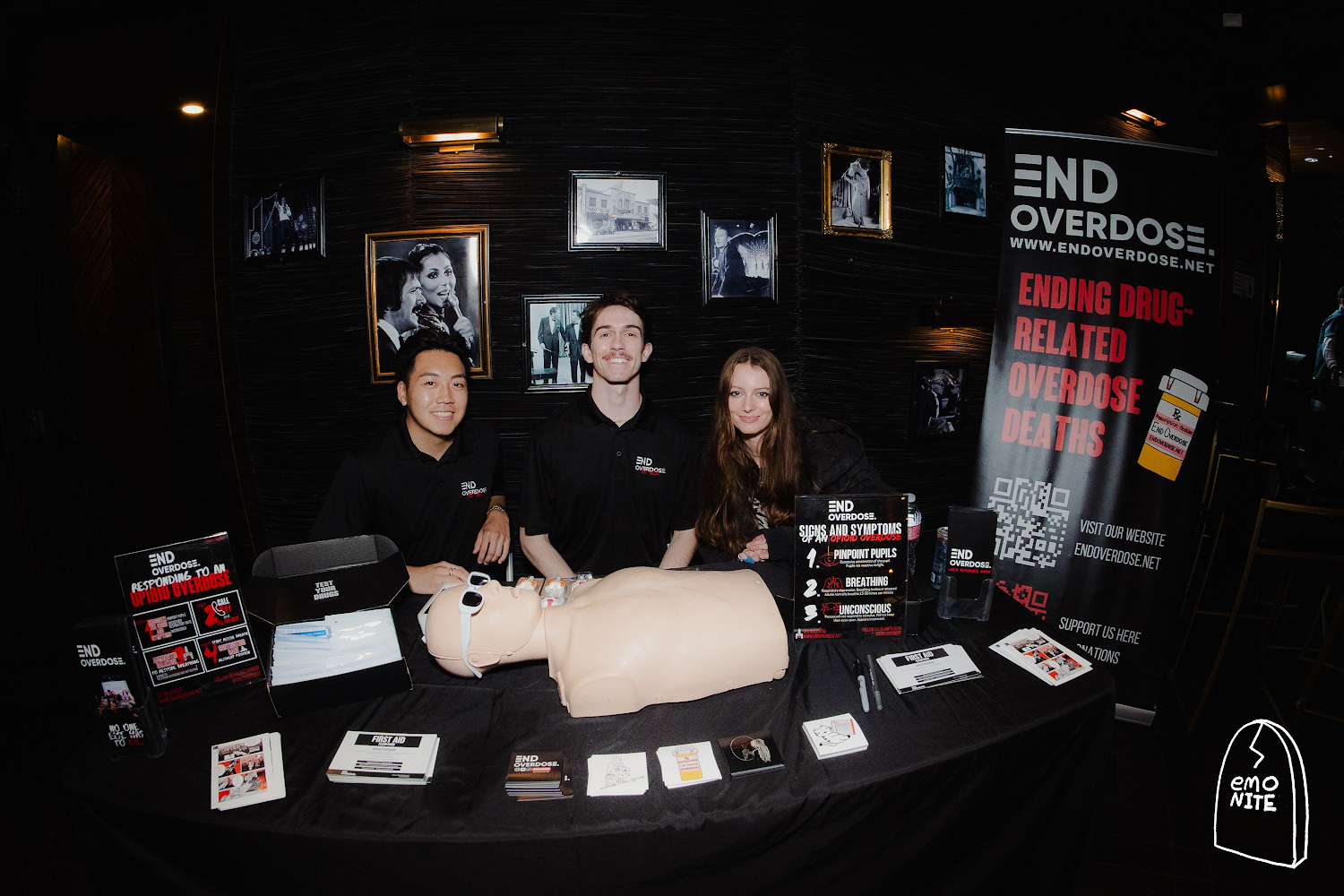
Whether it was at Emo Nite, or when I first saw their HEALTH-branded Narcan kits, it became evident that the crossover between music and addiction existed on the other side of the devastating epidemic as well. There was also an alt audience, harnessing the power of overdose prevention and response, making it relatable and relevant. And not only is music now a major throughline in End Overdose’s work on the ground, but it’s been one in the work Krzywicki has done on himself to arrive here.
As the lead singer of Circa Survive, Saosin, the Sound of Animals Fighting, and L.S. Dunes — while maintaining a successful solo career — Green has a lot on his plate. Not to mention he’s been navigating recovery, and very openly at that — on his personal platform, where he often shares harm reduction resources and avenues of seeking help, as well as through his music. Through each project, Green has been unabashedly emotional — however, his latest solo album, Boom. Done., overflows with a brilliant catharsis that is unparalleled. Track by track, the guts-baring project navigates the tactile treachery of getting clean and losing loved ones to addiction. To the naked eye, the LAFD and the LP may seem light-years apart, but beneath the surface, Green, just like Krzywicki, is in the business of connection. Connection to his own story, to the audience who seeks it, and, ultimately, to something much greater than the sum.
THEO KRZYWICKI: All right, so can I ask you a personal question? I don’t want to throw it out.
ANTHONY GREEN: We’re here.
KRZYWICKI: Fair enough. We’re here for that. So, I can’t listen to Circa Survive anymore — the album that always fucks me up is On Letting Go. It makes me want to cry. Honestly, don’t think that there’s anything more powerful than the way a song can just get you... What was going on there?
GREEN: Trust me when I tell you that I understand the sentiment and that I know what that is. I know the feeling of being faded and having music just cut through you because you’re tender. Music that is emotionally charged can have a pretty huge impact when you’re in that type of state. [With On Letting Go], there was a lot going on. I was heavily addicted to Xanax. I had gotten a credit card for the first time in my adult life that nobody saw the bill for but me. And so I ordered bulk from different online pharmacies where you’d get a DVD with another language and some weird graphic on it, and open it up and there’d be a purple Xanax in the DVD case.
KRZYWICKI: Yeah, that’s insane. I didn’t realize you could do that — I was not ordering.
GREEN: Yeah, I was really heavily addicted to Xanax and painkillers, but mostly Xanax at that time. And I was all conspiracy theories, 9/11 stuff, everything, the Bilderberg Group, the Trilateral Commission conspiracy, the Federal Reserve... My brain was in a tailspin, and I was hiding so much from everyone… Xanax makes you black out, and I’d wake up a lot of times where I’d have a mess around me and not know what I’d said or what I did, and I’d have these lyrics written, and I couldn’t decipher them. You’re never more anxious than when you’re abusing an anxiety drug…
I was really lost during the making of that album, and I was sure there was an answer somewhere in music, but I didn’t have the right tools to go searching where I was looking. I was in the dark, and I was choosing to be in the dark, but addiction as a theme has been on everything I’ve ever done — and it started pissing me off the last two years. I’m doing these albums, and I’m writing these things, and then you put ’em out and inevitably people are like, “So what’s this about?” And you end up making all this autobiographical shit, and you start seeing the patterns in your life, and you’re like, “I don’t want to be in this state that I’ve been in for 20 years of being addicted to heroin and opiates.” When you really decide to change, you have to commit yourself to feeling the pain and going through whatever you need to go through to fix, and to write, your path.
And it gets a little bit easier because then you’re dead set in the same way as when you were using. When you shift and you decide, “I’m going to give myself a chance. I’m going to see if this is worth it” — your experience, your life, is always so much better, your relationships are better, and feeling pain is better. Feeling conflict, being wrong, feeling embarrassed and constructive, shame, all those things are important. I crave the life experience now that teaches me those things. I still fuck up all the time, and it is a constant practice, but I never have to use again. Never have to do that. If I make that mistake, I know exactly where that leads me, and if I don’t do that, then the possibility of me making things good is still there.

KRZYWICKI: I’ve been sober for 13 years. I started using heroin when I was 13. I failed that battle. I went to war, I lost, and now we’re here. Now we’re here talking to you. What is going on?
GREEN: I pray a lot, and I talk to myself, and I talk to the universe, and I talk to the thing that I think is greater than us. I like to communicate with it, and I ask it to make me a vessel so that I can do what’s needed in this world to help or bring joy. And that takes me out of my default settings that keep me in the center of the universe. I ask it to make me the thing that is going to help other people today. Put me where I need to be so I can be of service to you. You don’t have to feel pressure. You don’t have to feel worried about what you’re doing because wherever the world takes you, you’re going to be of service.
But you can’t be aware and alert and available for that stuff when you’re in that ripping and running zone, self-medicating, and self-obsessed… Part of getting clean is realizing, “OK, how do I clean up how I think? How do I clean up how I live?” It’s not just about getting rid of the habitual drug use. It’s about all the habits. How do I talk to myself in a mode that keeps me in this state of mind? How am I living that keeps me in this state?
KRZYWICKI: I can imagine, as an artist, your entire life is laid open, in all of your music, all of the time. Creatives always have an innate ability to communicate with people in a way that no one else can. That’s why it’s so powerful when you carry a message to somebody that’s going to hit deeper than one from me. No one knows who Theo is, but when you carry a message, whether you say it, you write it, or you sing it, where does it come from? It just feels so much more powerful.
When I was listening to your music 13 years ago, I was probably in the worst time of my life, ever. I remember hearing one of your songs and just being like, “I don’t know what this is, but they get it.” And it felt like guidance, which is crazy. That’s as intense with music as I’ll get with you. I’ll never admit to shit, but that cut through something in me. And here we are all these years later, and I’m talking to you, and you’re sharing about how you found something greater than yourself and you developed a process of living while always having your heart out there, exposed. That’s a lot.
GREEN: The things that you hide and repress are the things that are going to end up killing you. For me, making my work autobiographical and living in a way where I talk openly about what is happening in my life has benefited me. But you said that me speaking about my feelings has a different impact than you, and I want to suggest that maybe that is a skewed perception of your view, not just of yourself, but of me and of this whole situation. When you hear an artist and what they’re saying resonates with you, it’s because they have made this connection with themselves, with their emotions, and that connection with themselves feels like a connection with you — because you are the same. We are the same power.

KRZYWICKI: It’s heavy. Everyone’s just trying to find themselves at the end of the day — and especially these days, when it feels like there’s no help or everybody’s lost, seemingly cut off from one another. We’re all just trying to find connections with ourselves and with the work that we do. It comes down to one person helping another person that makes a bigger impact than anything in the world. Those little interactions are what really make the difference.
With our organization, that’s what we’ve focused on — one person helping another. That’s why we’ve grown so much. Last year, we doubled the amount of people that we trained to respond to overdose by a hundred thousand people, and over 200,000 people decided that they wanted to learn how to respond to an overdose. And each one of those people wasn’t deciding to respond to their own overdose. They were deciding to respond to someone. I think people really do care about each other. We just forget everyone’s in their own little silo. And the moment that you do something, the moment you tap into that, that’s the unlock button.
There’s societal change that we want to see. Everyone just wants to have peace of mind. They want to have a good life. They want to have things. They want to be cared for. They want to be loved. But I think the most effective way is to put it out there. The moment that you put it out there, you forget all the other stuff, and there’s no better method of help. We see whole communities change right now. And for us, it’s a ton of effort on our part, but we want to do everything we can to make sure that they have that ability. At the end of the day, it seems insignificant. It’s like, “Why would I do this thing? Why would I just get educated? Or why would I just learn about this thing? Or why would I just be willing to help somebody else?” That changes everything. That’s what builds the world. That’s community.
GREEN: We’re built with this self-preservation that tells us to connect to others through all sorts of things. And just having you and your organization go out and tell people and help make connection does so much for the world. And it would be fucked up to not mention right now that we’re highlighting this issue that is this epidemic that’s happening in the world right now. In a world where there is literal genocide happening in front of our eyes, and the military and industrial complex that sort of controls all levels of information is working overtime right now to try to cover its tracks for the inhumane way that they’re operating in this world. I think people are starting to wake up now and understand what needs to happen. And sometimes on a micro level, making a difference in the global community means taking on something that you can manage and that you can have a direct effect [on].
KRZYWICKI: I mean, the problem is everything’s happening at the same time… And whenever you stand up and decide that you’re going to help a cause, there are always going to be people on the other side that tell you that they say crazy stuff. It happens with us all the time. We’ll just say something very innocuous like, “Hey, people shouldn’t die from something that’s accidental.” And you’ll get people on there that think you’re trying to give everybody drugs. They’re like, “Fuck addicts.” It’s like, “Hey, we’re just talking about humans, and there’s a bunch of ’em dying. Can we just make that not happen? We have all the tools here. We work together to solve it. We’re on your team.”
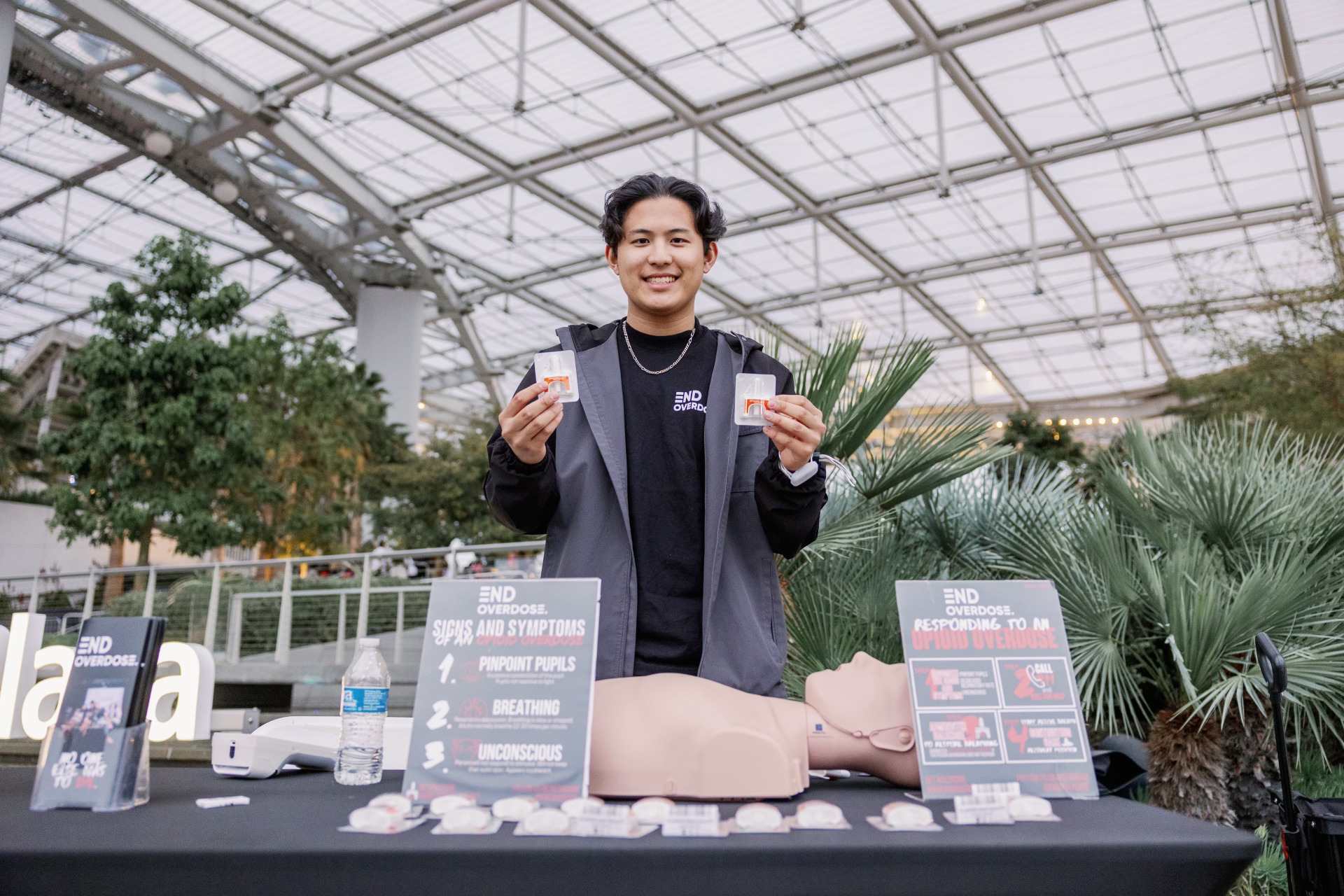
GREEN: Anytime I make a video and I’m like, “Hey, test your drugs,” I get a thousand people bailing on me being like, “Why would you tell people to do that?” Well, I would suggest testing your drugs if you’re trying to avoid fentanyl because it will kill you. And if you’re trying to do cocaine or ecstasy or some powder substance, you want to make sure fentanyl’s not in there. It can get in there really easily, not intentional, and no dealers like everybody dead. It’s being realistic. I love being able to go to a venue and talk to them about Narcan and bringing Narcan. People are going to use drugs. This world is so hard. I don’t necessarily subscribe to the idea that there are bad and good drugs. I think that drugs just are, and that our relationship with ourselves is bad, and I’m not going out and saying that if you have some great relationship with yourself that you can use heroin in a casual way. But I am saying that I do know people who use fentanyl for pain management and don’t abuse it. And it’s probably similar to people. It’s similar to anybody with a medical ailment that uses something in a medical way that has the proper info on it.
KRZYWICKI: It’s definitely a complex issue. Because obviously the trope is that if you use anything, you’re automatically categorized as a bad person. But not everybody that uses it is even an addict. One of the things that End Overdose tries to do is change the way that people engage with information. And one of the things that we’ve tried to do is really take a lot of the things that you see all around us all the time that are constantly trying to take our attention, but shape it for good, just like these different messages, like audio feedback, haptics, all sorts of things.
Part of that is attracting people to a cause that’s really good. Obviously working with you, working with artists, working with others, draws people to something that they wouldn’t ordinarily be drawn to. But what ends up happening is they discover that they have what we’ve been talking about this whole time, this innate desire to help others. Go out there and create that connection. It’s been an interesting process for us because we’ve just really been able to form a lot of this community grassroots, and it’s been through little suggestions, little changes, little ideas that people have. What do people want to see, and what do they want to connect with? And for someone like you, what are things that you see that just attract you to connect with them? I think that’s always something that we can all benefit from.
GREEN: You ever had to have that conversation with somebody where you explain to them why it’s better to save someone’s life than to let them OD?
KRZYWICKI: For sure. I’ve had to have many conversations like that where they hit you with some abstinence. You see it online more. But in person, someone would be like, “Why does this apply to me? Why does this matter?” And it depends on where that person is at. If someone’s coming off to you aggressively, they’re not interested in anyway. Some people, they’re looking for a fight, but some people say a backhanded comment, but they don’t know if they mean it. And you just challenge it.
You may be the only chance somebody has. You’re walking by, you see something, you’re with a friend, you don’t expect it to happen, and you’re it. You’re going to be the hero today, and you get to decide how you want to show up for that. We did a survey. We had over 29,000 people take the survey, and over 60% of ’em said they knew someone, at least one to up to five people, that had overdosed. And it shows you that if you don’t know someone directly, somebody knows somebody. At least now it’s so prevalent because there was a time where people didn’t know CPR, and we’re asking the same questions. Now it’s like, “Hey, this is a really simple thing to do.” Even if you just call somebody, even if you get on the phone and get someone coming, you’re going to save someone’s life.
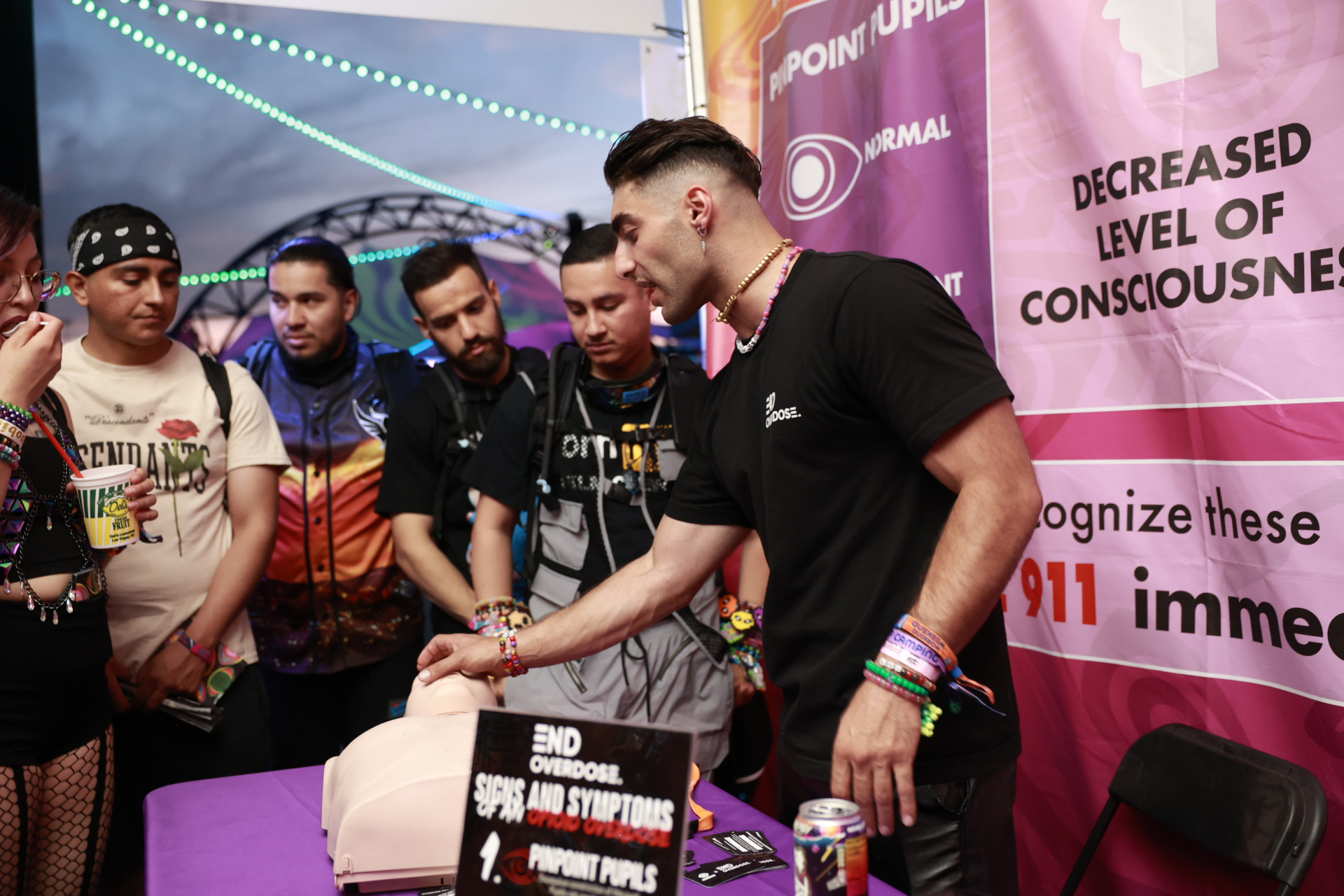
GREEN: Narcan saved my life. Three times. Anybody that likes my music that feels like they’re on the fence about that stuff — just know that.
KRZYWICKI: Did you use it on yourself?
GREEN: No.
KRZYWICKI: Someone else did, right? Who was it?
GREEN: It was paramedic police, and another time it was a stranger.
KRZYWICKI: There it is, man. You have to have all of it, and if you don’t have other people, none of us are going to pull through.
GREEN: Angels.
KRZYWICKI: Angels.
GREEN: Man, I love it. I love that we have the opportunity to do this, and I have so many good things in my life right now, and there’s a lot of things that I wish weren’t how they were, and I can’t change. But I owe everything I have today to being clean and sober to people like you, to Narcan, to people from AA and NA, to my friends and family. I hope that anyone that’s out there that’s on the fence and doesn’t think that they can do this hears us saying that they can and that there are people that will help them. I hope they start loving themselves enough to try to fix the thing that’s broken, and live a life of true joy.
KRZYWICKI: Because we need them. Especially the people that don’t think this applies to them. We need them the most.

